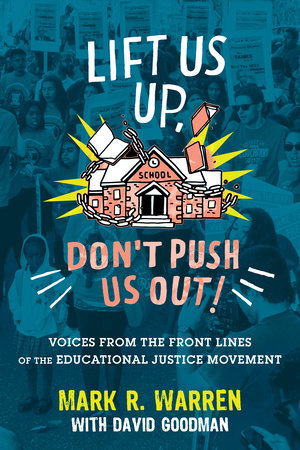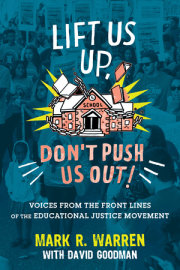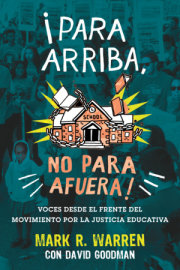Preface
INTRODUCTION
Building an Educational Justice Movement
Mark R. Warren
PART ONE: Building the Power for Change: Parent, Youth and Community Organizing
CHAPTER ONE
“I Can’t Make a Teacher Love My Son”: A Black Parent’s Journey to Racial Justice Organizing
Zakiya Sankara-Jabar
CHAPTER TWO
#SouthLAParentLove: Redefining Parent Participation in South Los Angeles Schools
Maisie Chin
CHAPTER THREE
Speaking Up and Walking Out: Boston Students Fight for Educational Justice
Carlos Rojas and Glorya Wornum
CHAPTER FOUR
Fighting for Gender Justice: Girls of Color Assert Their Voice
Kate McDonough and Christina Powell
CHAPTER FIVE
The Freedom to Learn: Dismantling the School-to-Prison Pipeline in the Southwest
Pam Martinez
PART TWO: Building Alliances for Systemic Change
CHAPTER SIX
#FightForDyett: Fighting Back Against School Closings and the Journey 4 Justice
Jitu Brown
CHAPTER SEVEN
There Is No National Without the Local: Grounding the School Discipline Movement in the Mississippi Delta
Joyce Parker
CHAPTER EIGHT
The School Is the Heart of the Community: Building Community Schools Across New York City
Natasha Capers
CHAPTER NINE
Fighting for Teachers, Children and Their Parents: Building a Social Justice Teachers Union
Brandon Johnson
CHAPTER TEN
#EndWarOnYouth: Building a Youth Movement for Black Lives and Educational Justice
Jonathan Stith
PART THREE: Educators for Justice: Movement Building in Schools, School Systems & Universities
CHAPTER ELEVEN
Teachers Unite!: Organizing School Communities for Transformative Justice
Sally Lee and Elana “E.M.” Eisen-Markowitz
CHAPTER TWELVE
Can Schools Nurture the Souls of Black and Brown Children?: Combatting the School-to-Prison Pipeline in Early Childhood Education
Roberta Udoh
CHAPTER THIRTEEN
System Change: Following an Inside-Outside Strategy as a School Board Member
Mónica García
CHAPTER FOURTEEN
Walking into the Community: Community Partnerships as a Catalyst for Institutional Change in Higher Education
Maureen D. Gillette
CHAPTER FIFTEEN
#schoolismyhustle: Activist Scholars and a Youth Movement to Transform Education
Vajra Watson
PART FOUR: Intersectional Organizing: Linking Social Movements to Educational Justice
CHAPTER SIXTEEN
Janitors Are Parents Too!: Promoting Parent Advocacy in the Labor Movement
Aida Cardenas and Janna Shadduck-Hernandez
CHAPTER SEVENTEEN
The Same Struggle: Immigrant Rights and Educational Justice
José Calderón
CHAPTER EIGHTEEN
Organizing Intersectionally: Trans and Queer Youth Fighting for Racial and Gender Justice
Geoffrey Winder
CONCLUSION
Conclusion: Educational Justice as Catalyst for a New Social Movement
Mark R. Warren
About the Contributors
Acknowledgments
Notes







